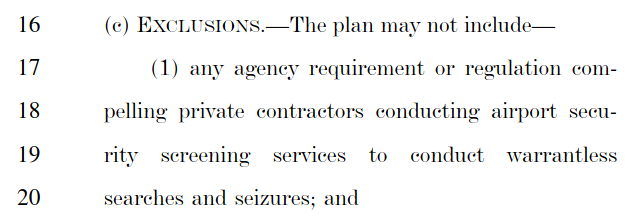Senators propose to abolish the TSA
If enacted, the Abolish TSA Act would abolish the Transportation Security Administration (TSA), in its entirely. Within three years of enactment of this bill, responsibility for securing airline flights, and for the cost of doing so, would be returned to the airlines and whatever private contractors they might hire. Responsibility for oversight over aviation security would be returned to the Federal Aviation Administration (FAA), as was the case before the creation of the TSA in 2002.
It should go without saying that if the new Department Of Government Efficiency (DOGE) is targeting wasteful programs and agencies, the TSA and its security theater should be near the top of the list. DOGE doesn’t have the authority to abolish the TSA, but Congress does.
In and of itself, privatizing aviation security won’t necessarily do anything to improve protection for travelers’ rights. As part of a largely stalled pilot program in privatization of searches of airline passengers, checkpoints at San Francisco International Airport and a few other smaller airports have been operated by private contractors almost since the creation of the TSA. The private contractors at SFO are trained to carry out the same searches of travelers as TSA agents at other airports, with the same intrusiveness.
Although we are unaware of any court ruling on the authority of TSA contractors at SFO or other airports, the TSA appears to think that these contractors have both police powers and the same “qualified immunity” that the agency has claimed for its own staff.
The Abolish TSA Act wouldn’t just privatize airline security, though. It would also provide, as part of the ground rules for a three-year transition plan for privatization, that:
The plan may not include… any agency requirement or regulation compelling private contractors conducting airport security screening services to conduct warrantless searches and seizures.
The main activity of the TSA is, of course, conducting warrantless searches. So this clause of the Abolish TSA Act would imply a major change in practices at airports.
We’d prefer that the word “compelling” in this sentence of the bill be replaced with “authorizing”. As introduced, the Abolish TSA Act might leave wiggle room for airlines or their contractors to claim that, even if they aren’t compelled by the government to perform warrantless searches as though they were police, they are still authorized to do so.
At a minimum, though, prohibiting the Federal government from compelling airlines to subject their passengers to warrantless searches would allow airlines to choose not to do so, deprive them of the defense that “the government made me do it”, and remove any basis for a claim of police-like qualified immunity against charges of battery or false arrest.
As of this writing, the Abolish TSA Act has not yet been docketed. We’ll update this article when the bill is assigned a number.
